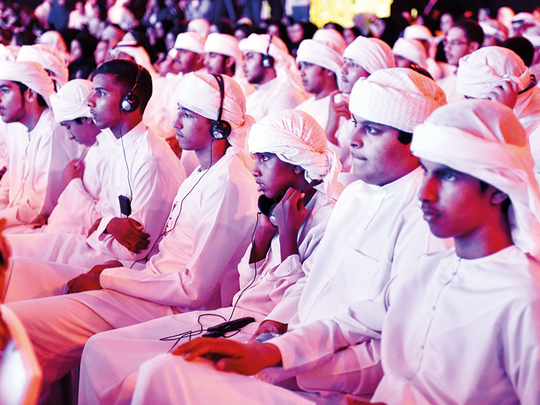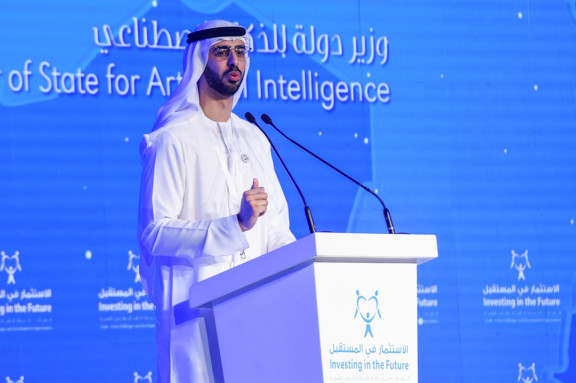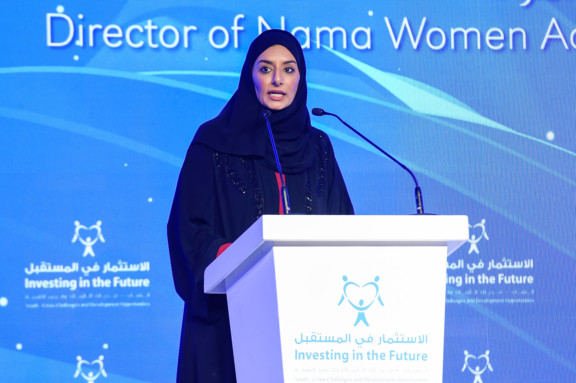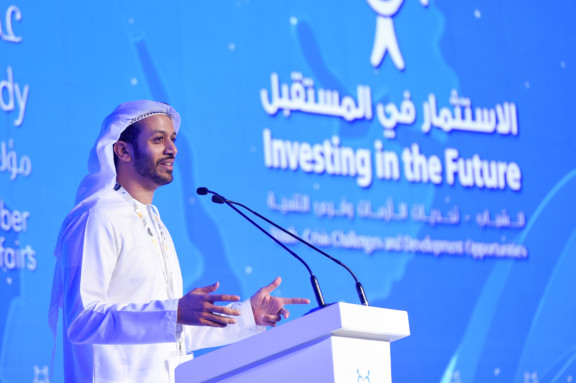
Sharjah: Youth have a responsibility to contribute to the development of the region and look into the use of future technologies for a better future for all, Omar Sultan Al Olama, UAE’s Minister of State for Artificial Intelligence said in a Sharjah conference on Thursday.
Speaking during opening session on the second day of the ‘Investing in the Future’ conference in Sharjah, the first Artificial Intelligence (AI) minister in the world told a huge audience of youth that they play a big part in the advancement of the nation.
The third edition of the conference, which ends on Thursday, is being held under the theme of ‘Youth - Crisis, Challenges and Development Opportunities’. The conference is organised by The Big Heart Foundation (TBHF), a Sharjah-based international humanitarian body focused on humanitarian and development challenges in the Middle East and North Africa (Mena) region.
“We in the UAE have to foresee the future in order to make UAE better for people. This is the approach adopted by the country’s founders and should be an approach taken by each one of you. We have to make sure UAE will be better place for future generation to live in,” said Al Olama.
Al Olama shared three stories discussing the importance of future foresight, significance of adopting change and the role youth play in this change.
“I always asked myself why the Arab region was living in backwardness in comparison to the rest of the world, although we are a civilisation that has given algorithms to this world and many inventions that changed the world came out of this region. Answer was difficult, but the main reason was the lack of adoption of changes and technologies,” he said.
He stressed on the importance to adopt technologies and not fear them “in order to have better development and a better life for people in region.”
The AI minister gave examples of two countries that discovered important resources, making them the richest around the world and then said one of them failed to foresee the future and exploited all its resources without investing in infrastructure and improving the life of citizens.
“As for Norway, who discovered oil in 1969, it is now among the richest countries in the world because it used revenues in oil to build infrastructure, educate youth and they even invested in SME and startups,” he said.
He concluded by mentioning that AI is part of youth’s everyday life now and said ‘each of you have to be aware how to use it and develop it for you to be able to adopt it.”
“We invest in you because you are behind the advancement and each of you should know their role in the future,” he said.
Also speaking during the opening was Reem Bin Karam, director of Nama Women Advancement Establishment. She said: “It is only possible to have stability when youth are integrated into the economy and society and are engaged in decision making.”
Bin Karam announced the launch of the ‘Wathba’ programme aimed at developing capabilities of youth.
The programme, launched by Rubu Qarn, a Sharjah organisation aimed at creating a generation of Emirati leaders and innovators, will select a number of university graduates that will be sent for internships to international organisations in order to acquire news sets of skills and capabilities required in the labour market.
“This programme is important in order to address the increasing mismatch between education outcomes and labour market needs. The labour market is advancing very quickly at a speed that is a lot faster than the development of curricula. This means that training in a real working environment is key to success,” she said.
The session concluded with remarks from Omar Al Bu Saidi, author, entrepreneur and a member of the US and UAE Public Affairs who told youth that one of the important skills of the future is the agility quotient and “that what’s going to be important is how agile, flexible and quick they are to adapt to new changes happening.”
More than 600 international officials, experts and youth attended the conference at Al Jawaher Reception and Convention Centre in Sharjah to discuss youth-related issues in the MENA region, especially those emerging from war, conflict and natural disasters.











